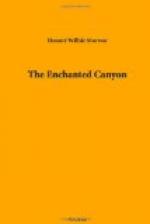The Secretary of State interrupted by bowing once more. “I very much appreciate my scolding, Mr. President. With your permission, I’ll withdraw until you feel more kindly toward me.”
The President and Enoch did not speak for several minutes after Fowler had left. Then the President said, “Enoch, how are you going to handle Brown?”
“I haven’t fully made up my mind,” replied Enoch.
“The bitterest pill you could make him swallow would be to put yourself in the White House at the next election.”
“I’m afraid Brown would look on that as less a punishment than a misfortune.” Enoch smiled, as he rose and said-good night.
Nearly a month passed before Enoch heard from Cheney. During that time neither from Fowler nor from the Brown papers was there any intimation of consciousness of Enoch’s existence. He believed that as long as he chose to remain silent on the Mexican situation that they would continue to ignore him. There could be little doubt that both Brown and the public looked on Enoch’s sudden silence following the Luigi statement as complete rout. Enoch knew this and writhed under the knowledge as he bided his time.
On a morning early in January, Charley Abbott answered a telephone call which interrupted him while was taking the Secretary’s dictation.
“It’s Mr. Cheney!” he said, “He’s very anxious to see you for ten minutes, Mr. Secretary.”
“Crowd him in, Abbott,” replied Enoch.
Abbott nodded, and in less than half an hour the director of the Survey came in.
“Mr. Secretary,” he began without preliminaries, “I took your advice and began investigating the trouble spots. Among other steps I took, I detached two men temporarily from a Colorado River expedition and sent them into Texas to discover if possible what the ordinary oil prospectors felt toward the Survey.”
Enoch’s face brightened. “That was an interesting move!” he exclaimed. “Were these experienced oil men?”
“One of them, Harden, knew something of drilling. Well, they struck up some sort of a pseudo partnership with a man, a miner, name Field, and the three of them undertook to locate some wells in southern Texas. They were near the Mexican border and were heckled constantly by bands of Mexicans. Finally, as the man Field, Curly, Harden calls him in his report, was standing guard over the horses one night, he was shot through the abdomen. Three days later, he died.”
“Died!” exclaimed Enoch. “Are you sure of that?”
“So Harden reports. Field knew that his wound was fatal. He was perfectly cool and conscious to the last, and he spent the greater part of the period before his death, dictating to Harden a long story about Hancock Brown’s early activities in Mexico. He swore Harden to absolute secrecy as to details and made him promise to send the story to some lawyer here in Washington, who seems to have taken a small portion of the Canyon trip with the expedition and who had prospected with Field.”




